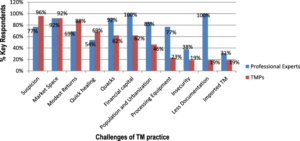Traditional Herbal Medicine in Africa
The regulation of traditional herbal medicines often faces several challenges in different parts of the world. These challenges include regulatory status, quality control, safety monitoring, and inadequate knowledge within national drug regulatory authorities. A few of the key challenges are discussed below. Each one of these challenges presents a unique opportunity to improve the regulation of herbal medicines and to provide better access to these medicines to people around the world. Below are some recommendations for the improvement of regulatory systems for herbal medicines in Africa.
The lack of specialization programs is a major challenge for practitioners of traditional herbal medicine. There is little or no regulatory structure for herbal medicines in many countries, which makes the production of such products difficult. The lack of training in the field has also led to a significant shortage of trained practitioners, and it is important to identify and address these problems. Herbal medicines are increasingly becoming available to consumers without a prescription. As a result, it is vital to ensure that manufacturers follow quality and safety standards.
The lack of specialization programs in African herbal medicine can be a major problem. Many practitioners in the region are not trained in the field. Additionally, the dosage of herbs used in these practices is often unclear and they are often prepared under unhygienic conditions. Finally, this type of medicine is not easily disseminated. This can make these treatments inaccessible to nontraditionalists and make it difficult for people to use them.

Challenges of Traditional Herbal Medicine in Africa
With these challenges, the future of African traditional herbal medicine looks bright. With proper collaboration, partnership, and transparency in the practice of herbalism, African herbal medicines have a bright future. Moreover, research and development of traditional herbal medicines will improve access to medicines for those who can’t afford the expensive imported ones. This will also increase employment opportunities. Large-scale cultivation and harvesting of medicinal plants will provide sufficient raw materials for research and industrial processing.
Developing countries in Africa should work together to improve the quality and safety of traditional herbal medicines. The quality of such medicine is crucial for the health of the people in the area. The effectiveness of such products will be evaluated by the relevant regulatory authorities. If they are not of good quality, they may not be used. A well-developed African traditional herbal medicine will be of value to local people and to global communities. It will help people in the region get access to the medicines they need.
There are several challenges to the practice of traditional herbal medicines. Most providers of medicines do not have adequate training in herbal medicine. Furthermore, they are not adequately trained. Despite the fact that there are a lot of advantages of herbal medicine, the most important challenge is its lack of transparency. The lack of transparency in traditional medicinal practices leads to a variety of negative effects. However, this can be overcome by establishing collaboration between patients and physicians, as it will improve the quality and safety of the treatments in African communities.


